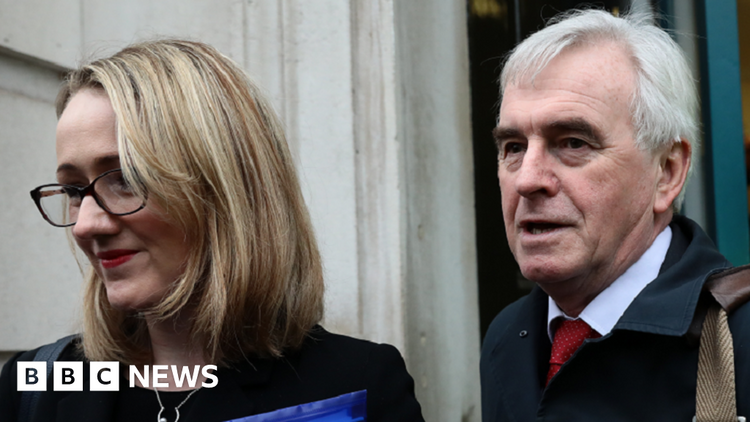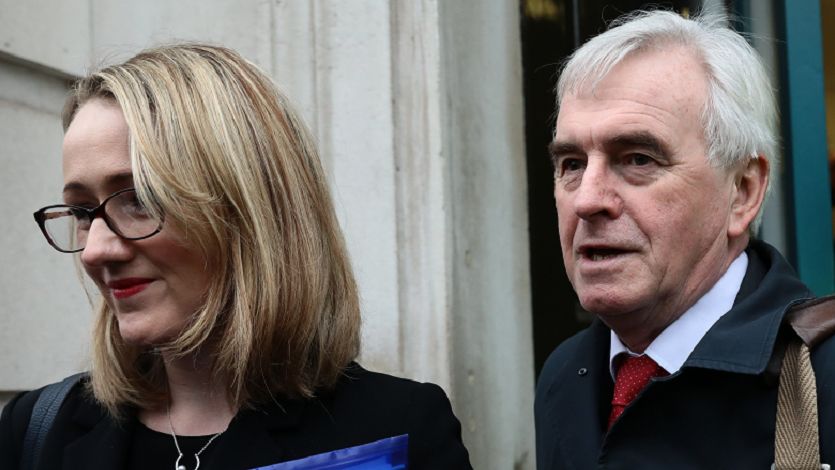Labour suspends seven rebel MPs over two-child benefit cap

This blog post contains pictures from Getty Images.
Previous opposition ministers Rebecca Long-Bailey and John McDonnell, who were part of Jeremy Corbyn's inner circle, were two of the seven individuals who voted against the government.

A group of seven Labour MPs have been temporarily removed from the party for six months due to their decision to vote against the government on an amendment to get rid of the limit on benefits for families with more than two children.
Former shadow chancellor John McDonnell was one of the Labour Members of Parliament who supported an SNP proposal to stop the policy that restricts most parents from receiving Universal Credit or child tax credit for more than two children.
Mr. McDonnell supported the SNP proposal along with Richard Burgon, Ian Byrne, Rebecca Long-Bailey, Imran Hussain, Apsana Begum, and Zarah Sultana.
Members of Parliament voted against the SNP proposal by a margin of 363 to 103, marking a significant challenge to the power of the recently elected Labour government.
Being stripped of their whip results in MPs being excluded from the main party in parliament and they will now take their seats as independent MPs.
Almost all of the dissenters were supporters of the ex-Labour leader Jeremy Corbyn, who is currently an independent Member of Parliament and endorsed the SNP proposal.
On a social media post, Ms. Sultana expressed her commitment to advocating for the most marginalized individuals in our society. She emphasized that eliminating the cap would help improve the lives of 33,000 children by lifting them out of poverty.
Mr. Burgon expressed his disappointment at being suspended, stating that a number of families in his Leeds East constituency had brought up their concerns about the cap to him.
Ms Begum explained that she voted against the cap because she believed it was making child poverty and food insecurity worse for families in the East End.
On the other hand, Mr. Byrne expressed that eliminating the cap would be the most effective way to assist his constituents in Liverpool West Derby who are experiencing poverty.
Prior to the vote, Mr. McDonnell stated: "I am not a fan of supporting amendments proposed by other parties, but I am taking cues from Keir Starmer, who emphasized the importance of prioritizing the country over party loyalty."
The choice to eliminate the whip is a strong move from the newly established government.
This marks their initial act of defiance. While it may be insignificant, Labour party officials are aiming to show Members of Parliament that rebellion during votes will not be accepted.
Yet, there are numerous Labour Members of Parliament who are against the restriction on benefits for families with more than two children.
Many people are hoping that the party will decide to get rid of it in the next few months.
According to a government official, Labour had already finalized their position on the two-child benefit limit before the election, and their promises in the manifesto were explicit.
The government has stated that they are not willing to make promises without having a plan in place to pay for them by getting rid of the cap.
Prime Minister Sir Keir Starmer has mentioned before that there is no simple solution to end child poverty, but he has also recognized the strong dedication of Labour MPs to this important issue.
The protest signifies another instance of Labour politicians pushing the government to get rid of the cap.
The leader of the Scottish Labour Party, Anas Sarwar, and the Mayor of Greater Manchester, Andy Burnham, have also expressed support for the proposed change.
Mr. Burnham stated on BBC Newsnight that the proof clearly shows that it does indeed cause damage.
However, he also emphasized the importance of party solidarity and expressed the need for the government to be granted "time and room" to devise a strategy to alleviate poverty.
The government was left with a "dreadful economic legacy", he mentioned.
Kim Johnson and Rosie Duffield, along with 17 other Labour MPs, signed a proposal to stop the cap. However, this proposal was not voted on.
Some well-known critics of the cap, like Ian Lavery and Nadia Whittome who supported alternative proposals, chose not to vote on the issue.
Dianne Abbott, a long-serving member of the Labour party and the oldest female MP, chose not to participate in the vote for personal reasons. In a statement, she expressed shock at the suspension of MPs for trying to uphold party policy by lifting the cap.
Emma Lewell-Buck, a member of the Labour party representing South Shields, supported a rebellious amendment. She explained that she did not vote against the government because none of the votes happening that night would have led to the cap being removed.
In a recent post on social media, externalshe mentioned that there will be an upcoming Autumn Budget. She expressed her intention to collaborate with colleagues and the Government to ensure that eliminating the cap is included in the budget.
Despite facing opposition, Sir Keir successfully navigated through the first major challenge of his government by passing the King's Speech.
Labour successfully opposed an effort by the Conservatives to add a change to the King's Speech that would have endorsed Tory ideas on defense budget, illegal immigration, and reducing inflation. The vote ended with Labour winning by a significant margin of 384 to 117.
An amendment proposed by the Liberal Democrats that aimed to make the government prioritize issues in the health and social care system, sewage dumping, and electoral reform was not passed. The amendment received support from Reform UK, the Green Party, and parties from Wales and Northern Ireland, but ultimately was defeated by a large margin with 382 votes against and 85 votes in favor.
Opposing political parties often attempt to modify the King's Speech to incorporate their own goals for the upcoming parliament, but their efforts rarely result in success.
The Minister for Work and Pensions, Liz Kendall, stated that the government cannot fix the negative consequences left behind by the Conservatives in a short amount of time.
But she stated that the Labour party was committed to making a significant impact on addressing childhood poverty.
The Institute for Fiscal Studies outside group has calculated that getting rid of it would end up costing the government £3.4 billion annually, which is approximately 3% of the overall budget for benefits for working-age individuals.
Ms Johnson, who has been at the forefront of Labour's efforts to eliminate the policy, suggested on Monday that the government needs to establish a definite schedule for its removal.
She stated that the issue is not whether we have the financial means to implement important policies that help reduce child poverty, like removing the two-child limit, but rather if we can afford to ignore the issue altogether.
"This harsh policy should be forgotten and left in the past where it belongs."
Before the vote, SNP Westminster representative Stephen Flynn stated that getting rid of the cap was the "absolute minimum needed to address child poverty and to start making the changes that people in Scotland were assured".























































